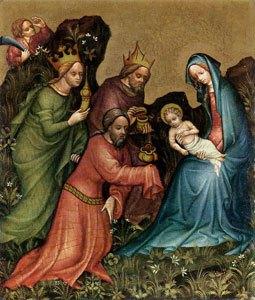 I learned about the season of Epiphany from the book of Daily Office Bible readings I stole from the Episcopalians some thirty years ago. First, I wondered why the advent readings focused on the end of the world; then I wondered why Matthew’s Magi stories didn’t show up until after Christmas.
I learned about the season of Epiphany from the book of Daily Office Bible readings I stole from the Episcopalians some thirty years ago. First, I wondered why the advent readings focused on the end of the world; then I wondered why Matthew’s Magi stories didn’t show up until after Christmas.
In my Baptist upbringing, the three wise men were right there, with the shepherds and all, at the stable in Bethlehem.
Luke and Matthew both have birth stories, but they are very different. In Matthew there is no suggestion that Mary and Joseph traveled to Bethlehem where they took shelter a cattle barn because “there was no room for them in the inn”. In Matthew, the holy family is settled in Bethlehem from the get-go, in a conventional cottage, when the Magi appeared bearing precious gifts of gold, frankincense and myrrh.
The word “epiphany” implies a “revealing” or a sudden appearance. In Matthew’s story, the incarnate Christ is revealed to three exotic Gentiles, a sign that the baby would grow up to preach good news to the entire human family.
But Christian tradition associates two other “revealing” stories with the season of epiphany: Jesus’ baptism by John the Baptist, and Jesus’ first miracle (in John’s gospel at any rate) at a wedding feast in Cana of Galilee. (Episcopalians find it highly significant that Jesus got his public ministry rolling by turning water into wine.)
The traditional Protestant marriage service claims that Jesus sanctified the institution of marriage by performing his first miracle at a wedding feast. This is an act of desperation. Jesus said very little about families, and what he did say casts the honored institution in a rather dubious light.
Jesus didn’t talk much about families; he talked about children, particularly children who grow up without parents, love, or a sense of personal dignity. Jesus disliked divorce because, then and now, easy divorce left impoverished women in charge of impoverished children.
Jesus’ close identification with the suffering of children was rooted in personal experience. The story of the Magi begins and ends with the mad king Herod. Because the Magi were looking for “the one born king of the Jews”, they stopped off in Jerusalem and inquired of the learned sages at the temple. Since everything that happened at the temple got back to Herod, normally in a matter of hours, the visitors from the east were quickly ushered into the presence of the man everyone called “the King of the Jews”.
The gold, frankincense and myrrh might have been lavished on Herod, but the temple sages had pointed the Magi to the obscure village of Bethlehem. But when Herod learned that a child born “King of the Jews” he took notice. He had slaughtered several members of his own family, including sons and wives, when he suspected them of disloyalty, and this child born king of the Jews must suffer a similar fate.
With great power comes great fear, and Herod was the most powerful man in Palestine.
Thanks to an angelic warning, the Holy Family escaped to Egypt moments before the soldier’s arrived; but the male children of other Bethlehem babies were not so fortunate.
Little wonder, then, that the teaching of the grown Jesus keeps coming back to children.
“Let the little children come to me, and do not stop them, for it is to such as these that the kingdom of heaven belongs.”
“Truly I tell you, unless you change and become like little children, you will never enter the kingdom of heaven. Therefore, whoever takes the lowly position of this child is the greatest in the kingdom of heaven.”
“It would be better for you if a millstone were hung around your neck and you were thrown into the sea than for you to cause one of these little ones to stumble.”
The salvation Jesus brings is tied to his vision of God’s kingdom; the kingdom vision is closely tied to the fate of children. Jesus calls us to serve “the least of these my brothers and sisters” including the sick, the prisoner, the impoverished, the oppressed . . . and the children.”
Conservatives and liberals are at their best when talking about children.
Conservatives hate abortion because it snuffs out the life of the emerging child. They hate irresponsible behavior because it damages defenseless children.
Liberals want children to have access to early childhood education, health insurance, and healthcare. They want to help the children of the working poor by making life easier for their parents. Liberals support abortion rights and sex education because every child deserves a stable family environment.
Conservatives and liberals, their policy differences notwithstanding, agree that every child deserves a first-rate education.
Culture warriors on the left and the right will always disagree, especially on hot-button issues; but so long as the needs of children are at the heart of the debate, common ground can be found.
Two epiphanies. Followers of Jesus must rise above a shallow liberalism centered on the desire of autonomous adults; and followers of Jesus must eschew a heartless conservatism that deprives vulnerable children of healthcare, safe streets and a decent education.
Jesus is always bringing the children into the midst, and we should follow his example.
